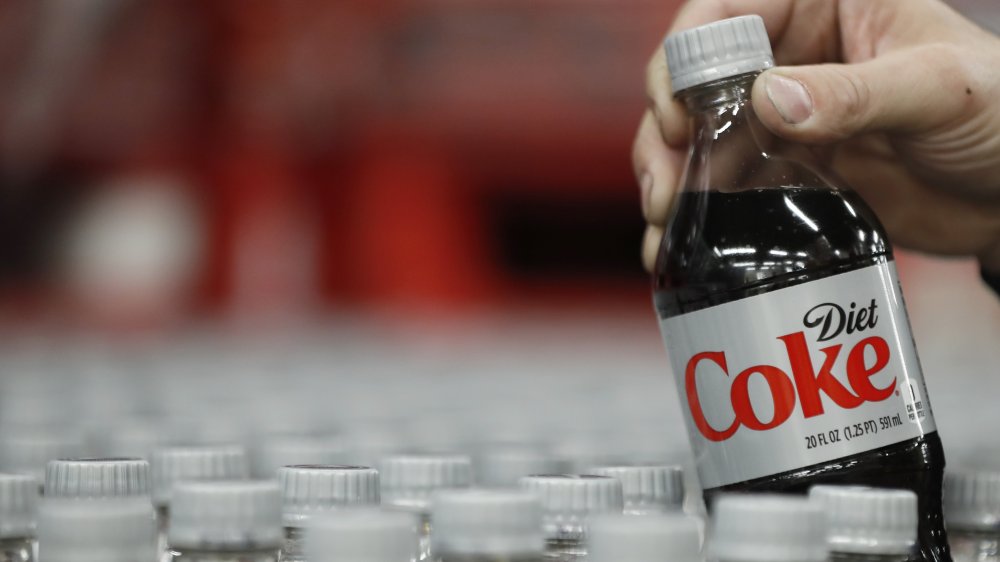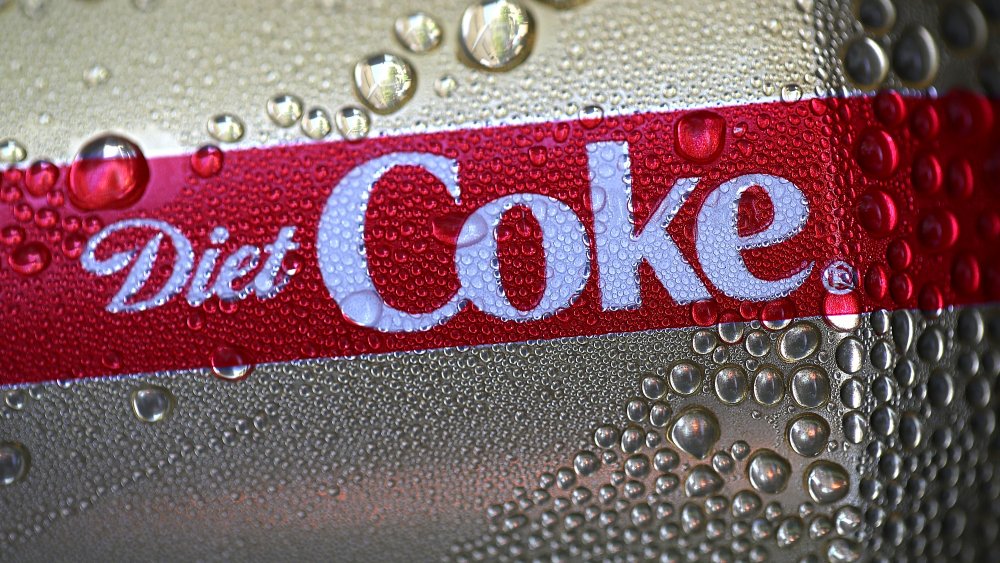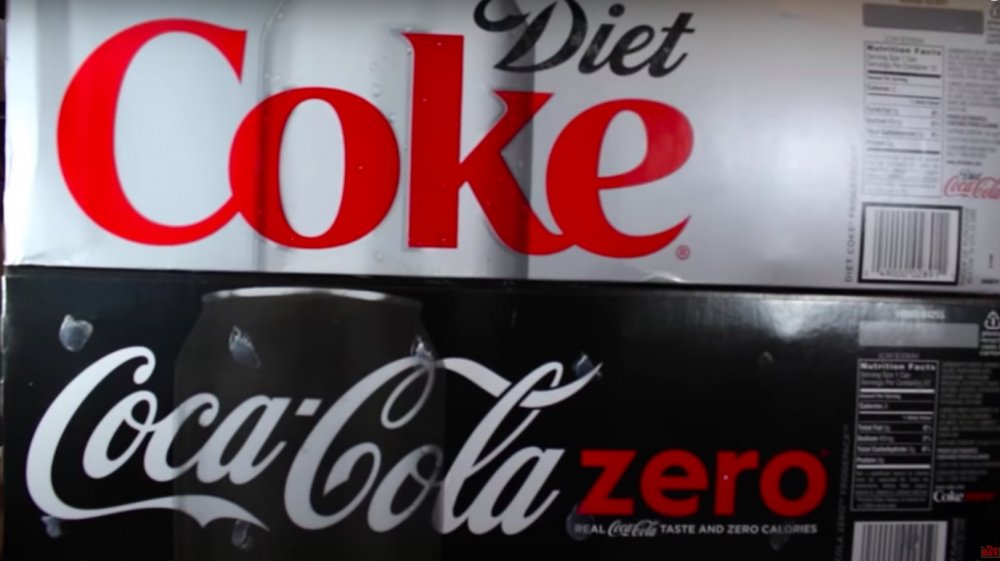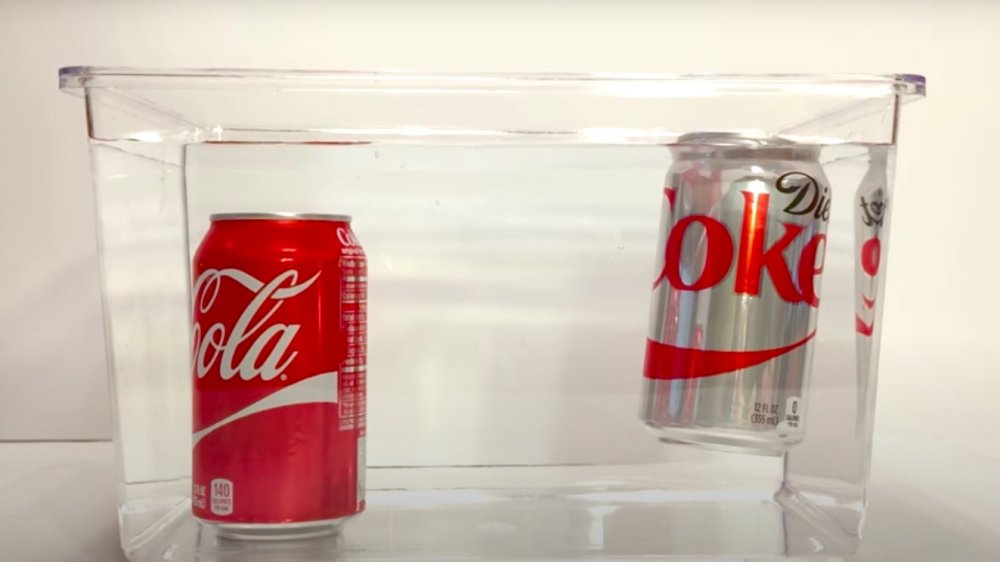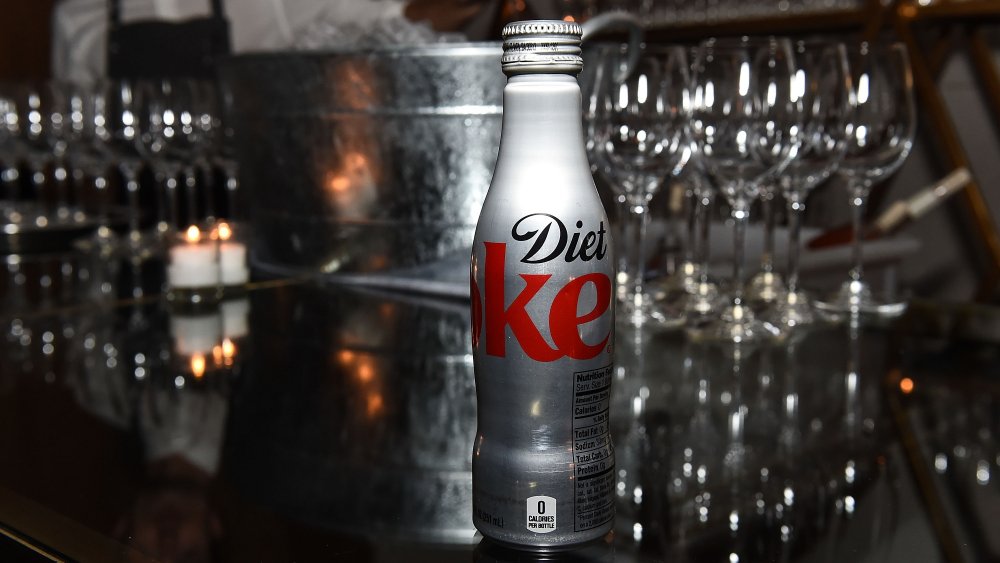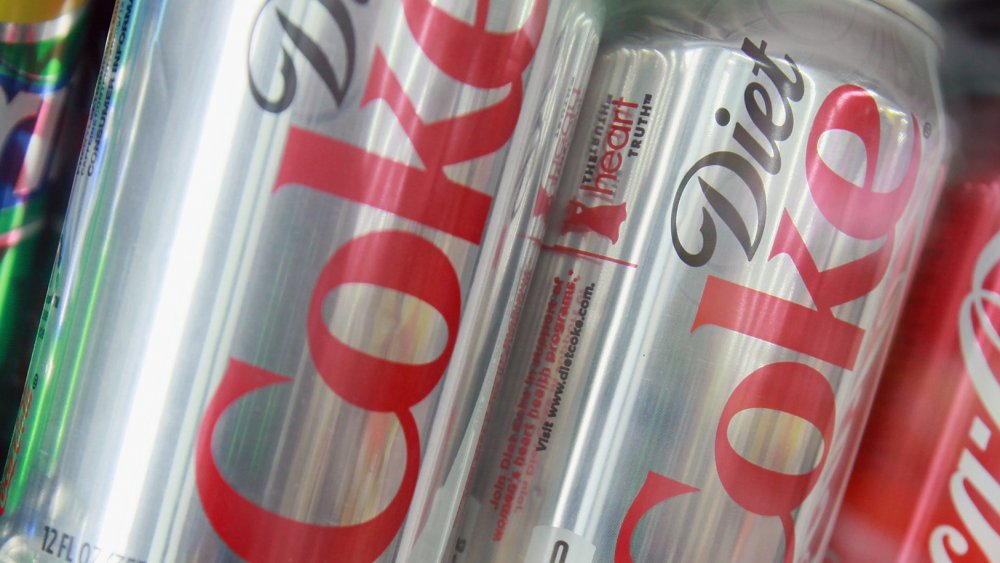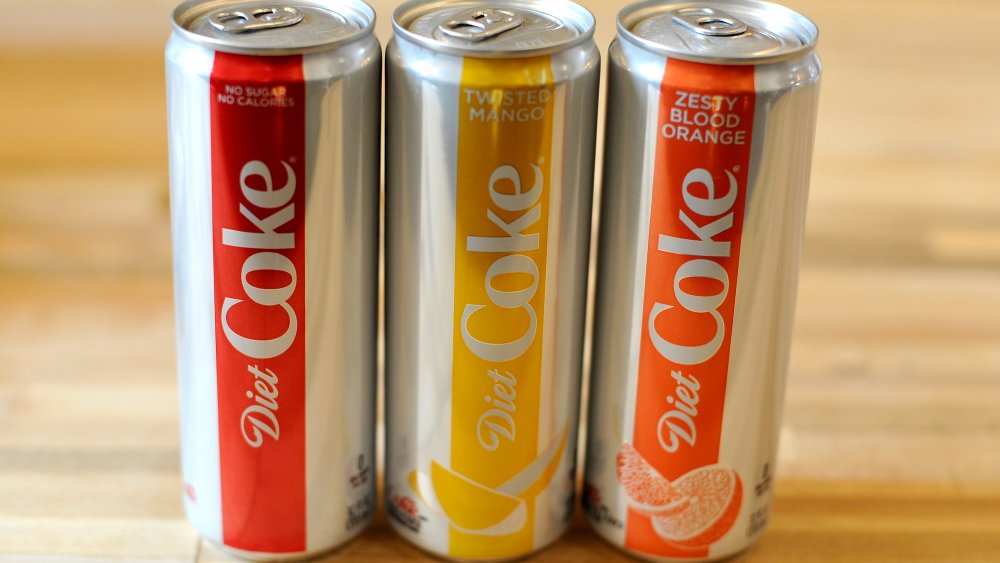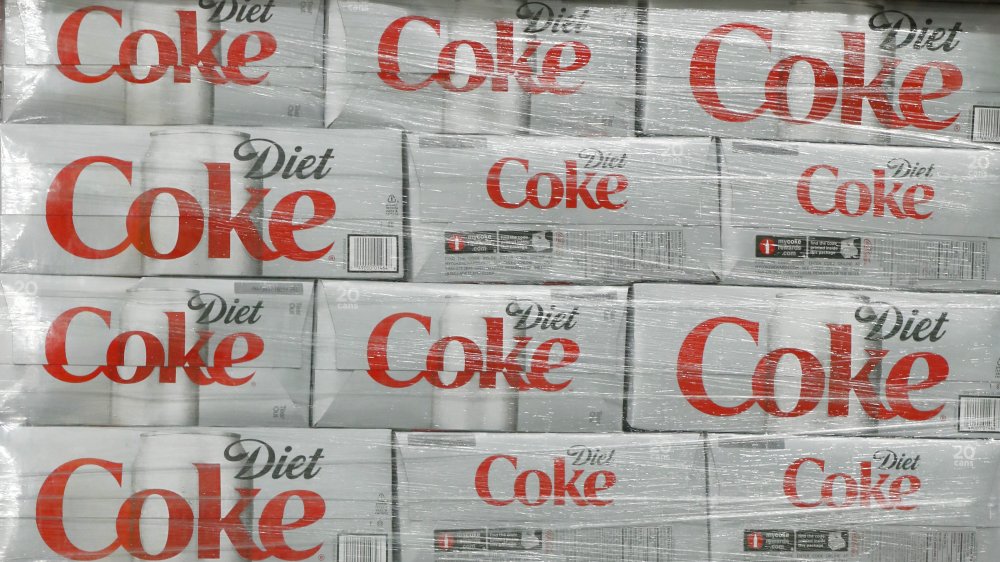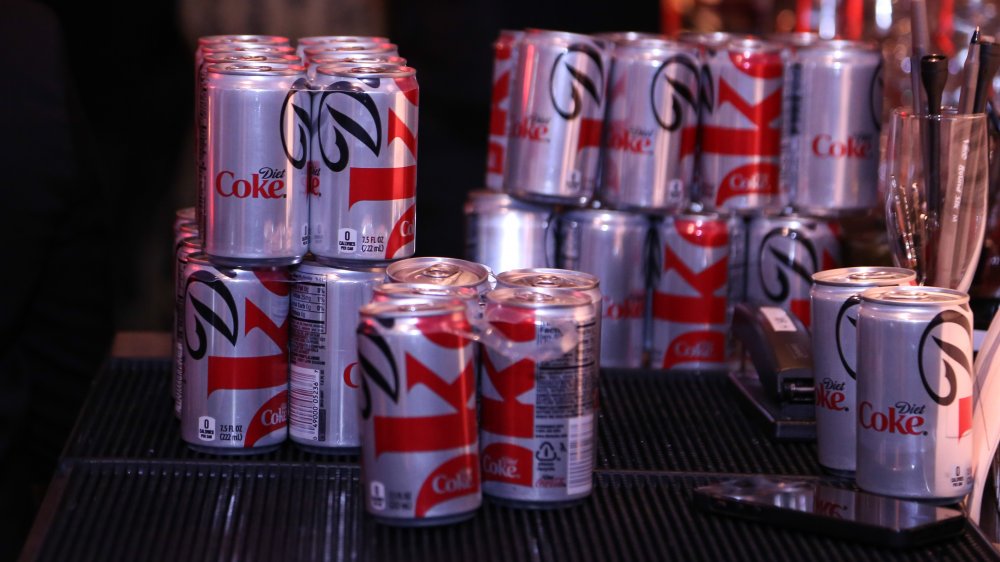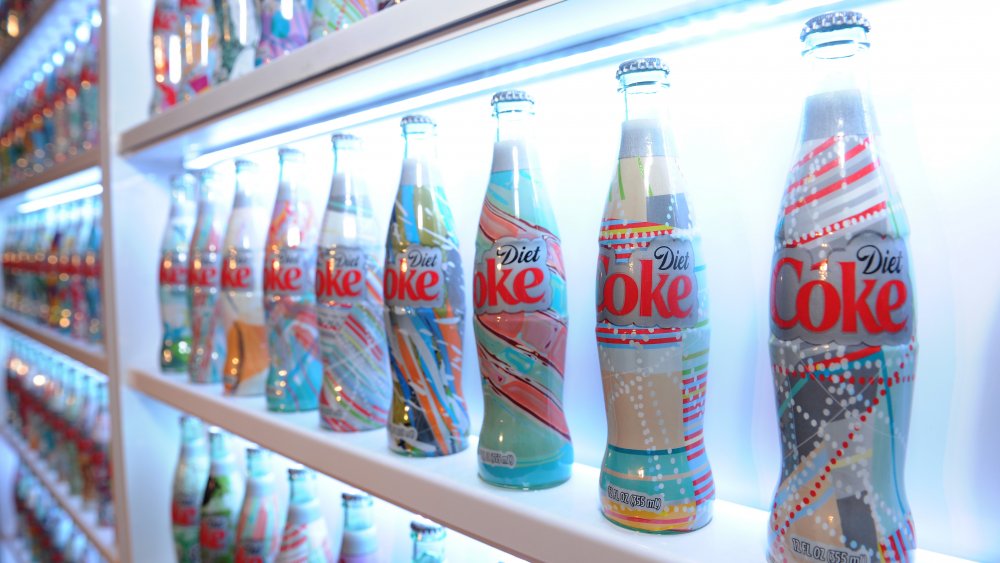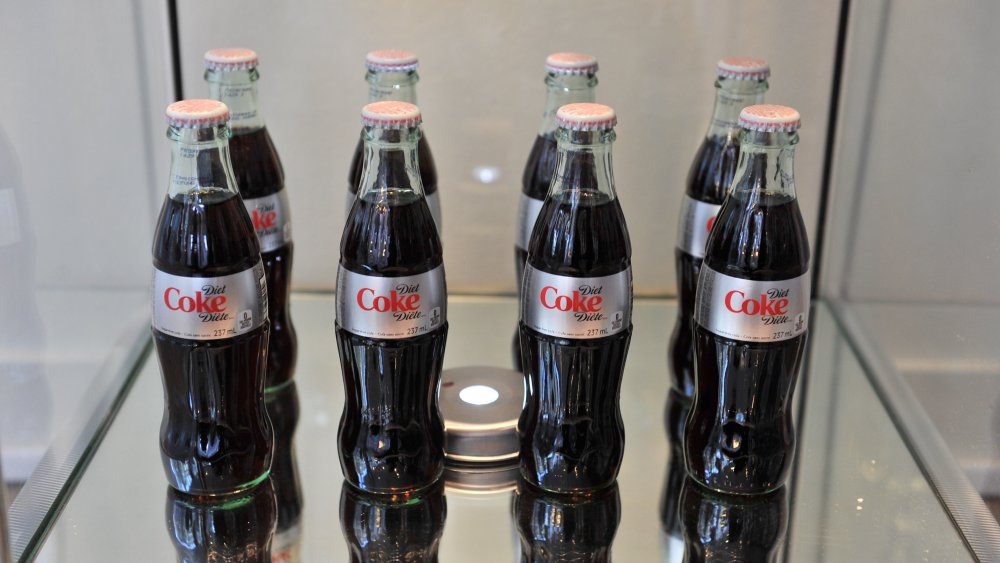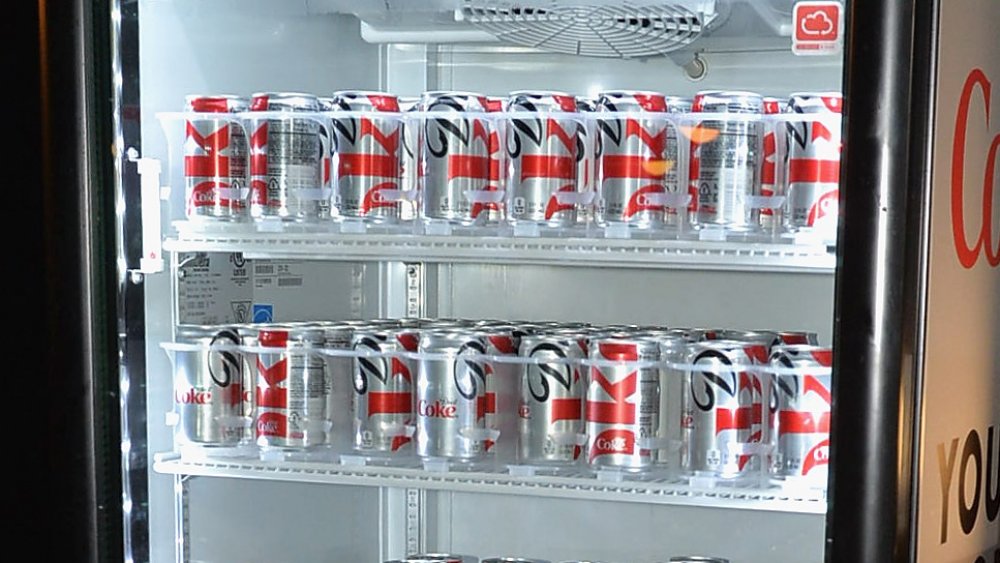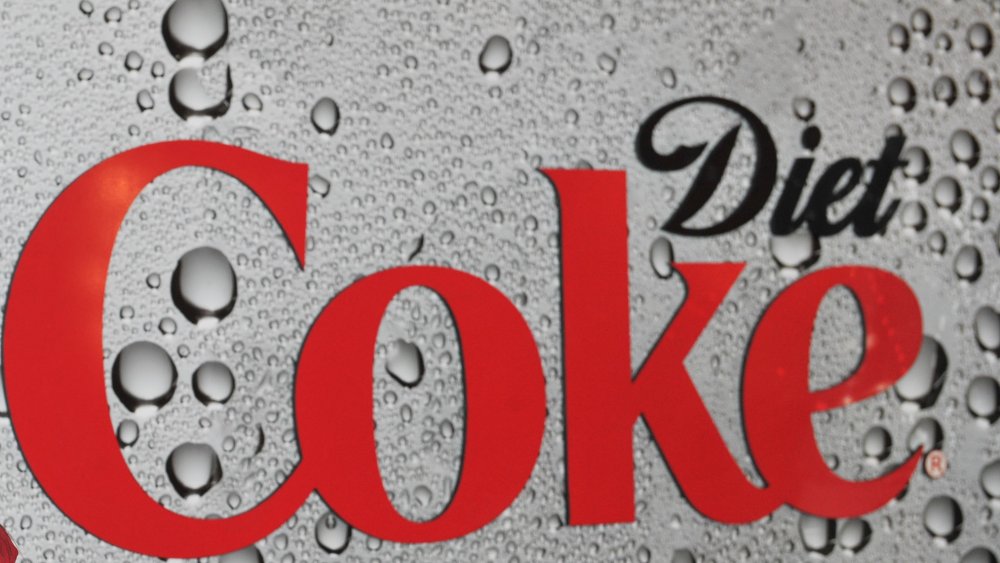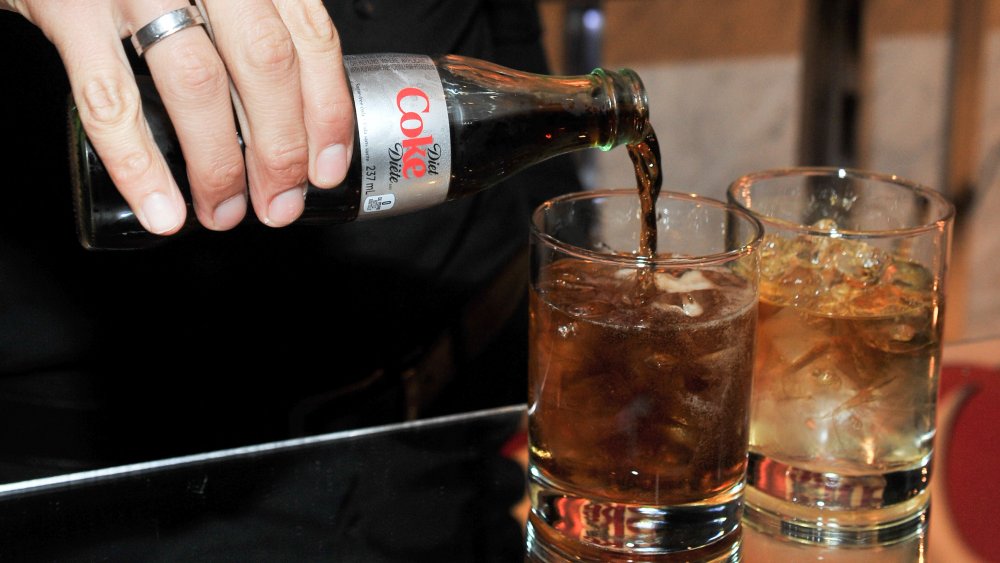The Untold Truth Of Diet Coke
Diet Coke has been a consumer favorite since its introduction in 1982, launched after a lengthy period of product development. Since then, the sugar-fee soda has earned legions of fans, including such celebrities fashion designer Karl Lagerfeld, who revealed to Harper's Bazaar that he drank Diet Coke "from the minute I get up to the minute I go to bed." President Donald Trump has also been identified as a heavy Diet Coke drinker, with The Washington Post reporting that he averages a dozen cans per day — more than a gallon of the stuff!
The product was an instant success, a testament to Coca-Cola's attention to detail when developing both the product itself and the marketing campaign that unleashed it. And while the popularity of Diet Coke has seen its peaks and valleys over the years, Brand Finance reported that a 2018 redesign and relaunch proved to be successful enough to generate an "uplift in sales" that propelled Coca-Cola to a 19 percent increase in brand value compared to the previous year.
Despite its ubiquity in the marketplace, how much do those who drink it really know about the diet soda? Read on to discover the untold truth of Diet Coke.
The invention of Diet Coke was a cloak and dagger mission
Coca-Cola took its sweet time entering the diet soda market, with a company history of the product revealing the idea for a sugar-free version of Coke had been "percolating" for two decades. During the 1970s, health-conscious consumers began eschewing sugar. While this hurt sales of traditional soda, it was simultaneously creating a whole new market for sodas that could offer all the flavor and none of the sugar. "We needed a big idea to come out of one of the toughest decades we'd ever seen," explained Coca-Cola planning manager Jack Carew, who was tapped to develop a sugar-free version of Coke.
While the development of Diet Coke was a key priority for Coca-Cola, very few people within the company actually knew about the top-secret endeavor. "It was an entrepreneurial, cloak-and-dagger operation in the purest sense," said Carew's colleague Jerry Bell, who worked with him on the Diet Coke project.
Market forces drove the development of Diet Coke as the company attempted to reach a "core demographic" identified as baby boomers who, as they became older and heavier, were ready to try a Coke alternative that wouldn't contribute as much to their expanding waistlines.
The only difference between Diet Coke and Coke Zero Sugar is a chemical you've never heard of
Diet Coke had been a fixture in the marketplace for more than 20 years when, in 2005, Coca-Cola launched a new — and very similar — product: Coke Zero, which would go on to co-exist with Diet Coke until it was ultimately rebranded as Coke Zero Sugar in 2016. While the two products are similar, anyone who's ever done a taste test of the two can attest that Diet Coke and Coke Zero Sugar do exhibit markedly different tastes.
According to an article in The Sun, Diet Coke has its own distinctive flavor that is quite different from Coca-Cola. Coke Zero Sugar, on the other hand, is meant to mimic the taste of the original Coca-Cola, just without all that pesky sugar. Yet when it comes to the actual ingredients, what goes into making the two sodas is pretty much identical, save for one key difference: Coke Zero Sugar contains a chemical called sodium citrate, while Diet Coke contains citric acid.
The reason why a can of regular Coke sinks in water while Diet Coke floats
Anyone who's ever stashed cans of Coke and Diet Coke in a cooler full of ice may have noticed an interesting phenomenon as the ice melts: a can of Diet Coke will float up to the surface of the water, while regular Coke will sink to the bottom.
As it turns out, there's a very simple scientific explanation for this. According to Business Insider, a can of Diet Coke weighs less than a can of Coke. But given that each can contains the same volume of liquid, 12 fluid ounces, what gives?
The difference is in the density of the liquid. A 12-ounce can of regular Coke contains 39 grams of sugar, while the same-sized can of Diet Coke instead uses the artificial sweetener aspartame, which is significantly sweeter than sugar and requires far less to achieve the same level of sweetness. This affects the density of each soda; because so little aspartame is used to sweeten Diet Coke, the resulting liquid is actually less dense than water, allowing the can to float. The additional weight of the sugar, however, makes regular Coke denser than water, causing it to sink.
There are no plans to tinker with the formula for Diet Coke
When changing market forces led Coca-Cola to rejig the packaging of Diet Coke and launch some new Diet Coke flavors, one thing that the company never placed under consideration was adjusting the recipe or changing the flavor. As Business Insider pointed out, even though Diet Coke had been losing market share, the product has remained a favorite of its devoted customers.
"I don't think we're likely to change Diet Coke," CEO James Quincey said in a 2017 call with reporters. "It has a large following." Fans of the soda, he insisted, should have no fear that the formula and distinctive taste would be altered anytime soon. "Diet Coke will be Diet Coke for a good while longer," he assured.
While that following is indeed dedicated, it had also been shrinking. According to another Business Insider report, the successful launch of Coke Zero Sugar (which replaced Coke Zero) appeared to come at the expense of Diet Coke. During 2016, sales of Coke Zero increased by 3.5 percent, while Diet Coke sales dropped by 1.9 percent during the same time frame.
The surprising reason Diet Coke was originally diet Coke
Longtime aficionados of Diet Coke may recall that when the product first launched, it had a different logo — and a slightly different name. That's because Diet Coke was originally diet Coke, with a lower-case "d" — and there was actually an interesting legal justification behind that.
According to a behind-the-scenes history of Diet Coke on the Coca-Cola corporate website, when the market plan was initially being developed there were words other than "diet" under consideration, such as "sugar-free" and "light." However, executives were wary of "sugar-free" as they feared it reflected poorly on sugar-laden original Coke; meanwhile, "light" was already being used by a competitor and the company wanted to avoid comparisons with other sugar-free sodas. The word "diet," however, seemed to be the most fitting descriptive, but Coca-Cola's lawyers were insistent that the word remain lower-cased.
The way the attorneys interpreted it, uppercase "Diet" was a noun, which would have necessitated changing the trademark. Keeping "diet" lower-cased meant it was being used as an adjective, and therefore kept the legalities of the trademark intact.
The reason why Diet Coke can ruin tooth enamel
Since childhood, everyone has heard warnings from parents and dentists that sugar will rot teeth. As Healthline explained, sugar does indeed encourage tooth decay — albeit indirectly, by combining with certain bacteria in the mouth to create an acid that eats away at tooth enamel and leads to cavities.
A sugar-free soda would seemingly be far less harmful to teeth, but that has not turned out to be the case when it comes to Diet Coke. A 2015 research study undertaken by the University of Melbourne's Oral Health Cooperative Research Centre exposed human molars to 15 different beverages, including milk, sports drink, sugar-sweetened sodas, and three different sugar-free sodas. Surprisingly, the study found that sugar-free soda and sugary soda were both equally bad for tooth enamel.
And while sugary soda and sugar-free soda both erode enamel, the way that happens is actually different with Diet Coke, which contains certain ingredients — particularly phosphoric acid — that combine with calcium to weaken tooth enamel. As the study noted, "polyol-based sugar-free products" such as Diet Coke may decrease the risk of dental caries (a.k.a. cavities), although the phosphoric acid will actually cause more dental erosion. Just another reason to avoid that Diet Coke refill when eating out.
Slumping sales led to new flavors of Diet Coke
By the mid-2010s, sales of Diet Coke were on a decidedly downward trajectory. By 2017, reported Beverage Marketing, sales of bottled water had, for the first time ever, surpassed soda to become America's top beverage category. The growing popularity of bottled water was bad news for Diet Coke and other sugar-free sodas, as it was cutting directly into the category's market share.
In response to Diet Coke's slumping sales, Coca-Cola made a big move. According to a 2018 press release, the Diet Coke can underwent a redesign to arrive at a slim new look. In addition, four new flavors were introduced targeting millennials, with original Diet Coke joined by Twisted Mango, Ginger Lime, Zesty Blood Orange and Feisty Cherry varieties.
"Diet Coke is one of the most iconic brands loved by millions of fans in North America," said Rafael Acevedo, Coca-Cola North America's group director for Diet Coke. As Acevedo explained, the company's goal was to "be bold, think differently and be innovative." The ultimate intention, he explained, was to ensure that the company "stay true to the essence of Diet Coke" while "recasting the brand" in hopes of reeling in a new generation of Diet Coke drinkers.
A centenarian credited Diet Coke for her long life
In 2018, Theresa Rowley of Grand Rapids, Michigan celebrated her 104th birthday and shared the secrets to her longevity in an interview with WZZM 13. One of those secrets was her longtime Diet Coke habit, revealing that she drank at least one per day.
"I drink it because I like it," she explained. "I'm going shopping Wednesday, and I need more Diet Coke. I have a bag full of empty Diet Coke cans that I need to return to buy more Diet Coke." Of course, Rowley couldn't claim that she'd been drinking it all her life; given that Diet Coke wasn't introduced until 1982, Rowley would have been in her late 60s at the youngest before receiving the first taste of her favorite beverage.
Looking back at her long life, Rowley recalled that when she turned 100, she "never thought I'd be 104. I thought I'd pass away by that time but it just didn't happen."
Diet Coke may actually lead to more weight gain than regular Coke
Given that the word "diet" is right there in the name of Diet Coke, it would be easy to assume that drinking Diet Coke would be better for one's waistline than regular sugar-laden Coke. Not only is that not the case, but a research study indicated that drinking diet soda can actually lead to weight gain, not weight loss, particularly in older consumers.
A 2015 study published in the Journal of the American Geriatrics Society drew a direct link between diet sodas such as Diet Coke and obesity in people aged 65 and older. The study monitored 749 subjects and found that those who drank diet soda demonstrated an increase in waist circumference that was nearly three times that of those who didn't drink diet soda.
University of Texas researcher Sharon Fowler, lead author of the study, determined that "increasing diet soda intake was associated with escalating abdominal obesity, which may increase cardiometabolic risk in older adults."
Why Diet Coke increases the craving for calories
Another study, undertaken by the University of Sydney in Australia, followed on that earlier research to determine why sugar-free soda was associated with weight gain and not weight loss. The study came to an interesting conclusion: drinking Diet Coke and other types of artificially sweetened diet sodas can lead the brain to crave more calories than it otherwise would.
According to a press release for the 2016 study, which was published in the Cell Metabolism journal, researchers confirmed that diet soda actually makes those who drink it feel hungrier. As a result, those who drink artificially sweetened soda such as Diet Coke will ultimately eat more than they would if they were drinking a sugar-sweetened beverage.
The study found that the brain expects sweetness to be accompanied by calories. When the brain's pleasure center experiences the sweet taste without the accompanying calories, the brain then "recalibrates" and causes the brain to crave the calories it was expecting to receive. "After chronic exposure to a diet that contained the artificial sweetener sucralose, we saw that animals began eating a lot more," said the study's lead researcher, associate professor Greg Neely.
A Diet Coke and fries isn't the best food combination for your health
A 2018 study co-authored by Yale researcher Dr. Dana Small dug deeper and came up with some even more surprising findings. Not only can drinking Diet Coke and other diet sodas lead to craving more calories, but that becomes considerably more pronounced when the soda is combined with carbohydrates.
According to the study, consuming carbohydrates and artificial sweeteners together will lead to confusion in the brain, blunting its response in metabolizing what is perceived to be sugar but actually isn't — what Small describes as a "circuit change" within the brain. If this "blunting" effect keeps happening on an ongoing basis, difficulties can arise when the brain and body attempt to process the nutrients but aren't receiving accurate information.
"If you're going to have a diet drink, don't have it with French fries," Small told Inverse. "Have the diet drink by itself and if you're going to have a diet drink, give an hour on either side and it should be fine, at least in small quantities."
A viral infographic about the dangers of Diet Coke was debunked
Back in 2015, a shocking infographic about the dangers of Coke became a viral sensation as it ricocheted throughout the internet. That was followed by another focusing on the hazards of Diet Coke, claiming to detail the scientific effects on the human body one hour after drinking Diet Coke.
However, BuzzFeed broke down the infographic and reached out to some actual scientists to see if the information detailed in the infographics was accurate. As it turned out, the scientists were able to debunk many of the claims in both infographics, particularly one alleging that the combination of caffeine and aspartame in Diet Coke creates "an addictive high similar in the way cocaine works."
Dr. Michael A. Taffe, an addiction researcher from the Scripps Research Institute, explained to BuzzFeed that the claims in the infographic were "overblown" and should be taken with a grain of salt. According to Taffe, the amount of caffeine found in a can of Diet Coke "is not going to have very large functional effects in most people and particularly not those who consume caffeinated beverages somewhat frequently."
A controversial chemical was removed from Diet Coke
In 2008, Diet Coke removed a controversial ingredient from the soda's formula. Diet Coke revealed plans to stop using sodium benzoate. The company's announcement came after the release of research concluding the chemical could cause cell damage, resulting in changes to the DNA that were linked to hyperactivity, Parkinson's disease, and cirrhosis of the liver.
The 2007 study from molecular biologist Dr. Peter Piper of Sheffield University, reported The Telegraph, was not mentioned by Coca-Cola when the company confirmed it would be removing sodium benzoate from Diet Coke. According to a statement given to the Daily Mail, Coca-Cola was removing the ingredient as a response to increasing consumer demand for more natural products. "We are continuously listening to our consumers' thoughts about ingredients." a Coca-Cola spokesperson told The Daily Mail. "For a number of years, we have been moving towards non-artificial colors, flavors, and preservatives where possible in our drinks. We are looking to phase out the use of sodium benzoate where technically possible."
A mixed drink with Diet Coke is more inebriating than one with regular Coke
When having a mixed drink, there's a difference between mixing booze with regular Coke and Diet Coke that goes far beyond the disparity in taste. A 2015 study on diet soda found some surprising results, indicating that drinks mixed with artificially sweetened soda led to a higher concentration of alcohol as measured in the breath.
Researcher Dennis Thombs was working on a similar study, and told NPR why this was. As he explained, "it is not that diet soda accelerates intoxication. Rather, the sugar in regular soda slows down the rate of alcohol absorption."
However, the study determined that the subjects didn't notice a difference in their own levels of intoxication based on whether they were drinking diet soda or regular soda, which could place them at higher risk of drinking and driving. "I wanted to know if the choice of a mixer could be the factor that puts a person above or below the legal limit," the study's author, Northern Kentucky University's Ceceile Marczinski, told NPR of why she undertook that particular line of research.
